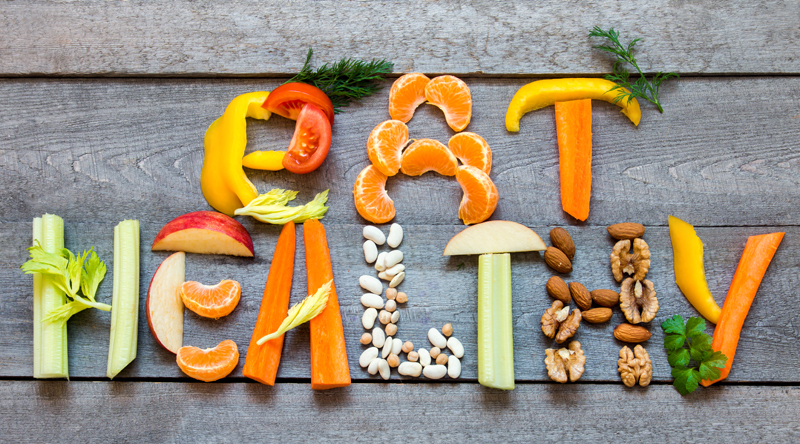So often, women who are struggling with some of the more unpleasant physical symptoms of menopause don’t make the connection between what they’re eating and how lousy they feel.
But it’s an incredibly important link to make because if you get the nutrition right — using food to support your body instead of working against it — this can make a huge difference to how you cope with that inevitable stage in a woman’s life.
The problem is that many of us arrive at the menopause still eating and drinking as we did in our youth.
Instead, we need to accept that the days when we could skip meals, eat on the hoof and still feel fresh as a daisy after indulging in several glasses of wine the previous evening are, to put it bluntly, long gone.
Menopause is a time of physical transition. If you are a mother who has seen a child through puberty then you will, no doubt, have made sure that they were well-nourished throughout. But it’s not just a child’s developing body that needs regular meals which are balanced, healthy and bursting with nutrients.
If you’re approaching or going through the menopause, then your body will also be working overtime as it adjusts to the associated hormonal changes.
In other words, you need to start taking care of yourself the same way you would a pubescent child.
Unfortunately, as women, we’re not exactly primed to put our own needs first. We’re hard-wired to nurture; to make sure that those we love have everything they need without giving the same consideration to what we might be lacking. Indeed, many of us have a blind spot when it comes to recognising the relationship between our physical ailments and not taking good enough care of ourselves.
Any woman wanting to embrace the menopause — and experience it as a happy transition rather than a depressing decline — needs to adjust their thinking.
Menopausal symptoms can extend far beyond the hot flushes that people generally associate with this life stage. Women sometimes come to my nutrition clinic looking for help with other physical problems, without necessarily realising they’re connected to the menopause.
Some might talk about experiencing depression, anxiety, brain fog and debilitating exhaustion. Others complain of lank hair, aching joints and brittle nails.
Many women are plagued by headaches. Insomnia, persistent UTIs and lost libido can cause problems, too.
Once I start looking at what they’re typically eating it soon becomes apparent why they are struggling — they aren’t eating the right foods in the right quantities needed for their bodies to function properly.
‘I’m eating the same way I always did,’ is a refrain I often hear. But the menopause puts the body under huge strain. To cope, it needs the right fuel in the tank — and plenty of it.
HRT helps many women suffering with extreme menopausal symptoms. But if your body is poorly nourished, you will still face an uphill battle even with those extra hormones in your system.
Now is the time when your nutrition levels need to be at their absolute optimum. A big problem in achieving that is a general misunderstanding of what we think we should be eating in the first place.
The generation of women now going through the menopause grew up being conditioned to believe that calories are something to restrict and that dietary fat is the enemy. We need to flip that thinking on its head.
It’s a huge mistake to eliminate foods such as nuts, avocado, hummus, oily fish, or meat from grass-fed cattle just because they’re high in fat.
These foods are actually every menopausal woman’s friend, because they contain good levels of mono and polyunsaturated fats which, in the right balance, will speed up your metabolism, support brain and heart health, keep your hormones happy and leave your skin in great shape.
Following an overly restrictive diet or a drastic detox might — if you’re lucky — help you lose a few pounds in the short term, but in my clinical experience this quick fix is soon reversed.
More likely is that you’ll confuse your metabolism and your body will seek to regularise the situation, meaning you may find that you regain or even exceed your original weight a few months later.
Understanding how the body uses the calories from different types of food to achieve varying things helps debunk the idea that they are something you need to count and restrict.
Dietary fats could certainly do with a rebrand when it comes to helping women get through the menopause.
Our bodies use fat to create sex hormones. If ever there’s a time we need to support our bodies in that vital work, it is now, during the menopause. The fact that calories from fat can support heart and brain health, too, makes following a very low-fat diet counterproductive for any woman struggling with brain fog.
Fats also activate what’s called the satiety response, which is when your brain knows to tell your body that you are full, preventing you from over-eating. So, you see, fat really isn’t the enemy at all.
Women also don’t prioritise protein in their diets enough. Yet it aids every bodily function: it helps the body heal wounds; develop and maintain muscle strength (including within the most important muscle of all, your heart); build bones; and replenish your skin, nails and hair.
The body also uses the amino acids found in protein to create vital neurotransmitters that govern mood, memory, motivation and concentration. These are all key factors for women in midlife.
We really ought to be eating protein with every meal. And yet new clients often tell me they eat a bowl of cereal for breakfast and a salad for lunch (because they’re counting calories), only finally getting a portion of protein onto their plate, in the form of chicken or fish perhaps, with their evening meal. That’s nowhere near enough.










